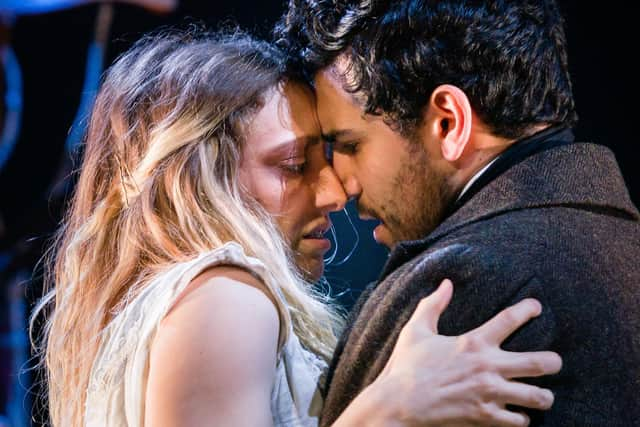Cathy as a rock star? An electrifying riff on Wuthering Heights


There is a point in every performance of Wuthering Heights when Lucy McCormick has a chance to look out at the audience. Playing Cathy in the Emily Brontë adaptation, she is close enough to do a mental survey of the front row. "The range of faces staring back at me is quite broad," she laughs. "They go from smiling exhilaration to aghast."
Such reactions are not surprising. In the scene in question, McCormick has grabbed the mic to sing a wild heavy-metal song, complete with wind machine and a three-strong band. Cathy-as-rock-star might not be what everyone remembers from reading the book, but maybe they were reading it the wrong way.
Advertisement
Hide Ad"Lots of people have said they have never seen Cathy done this way," she says. "But when I read the book, she is completely out there. She's always having fits, tantrums and screaming and crying. To me, the idea is odd that she should be played as a meek little pretty heroine."
For Cathy to break into song might be unexpected but it is a shortcut to dramatising the novel's themes. "In the book, you get all the time to describe what is, I suppose, Cathy's nervous breakdown," she says. "The song is a kind of exorcism. It's playing with the form to have another way of describing her different dimensions."
This is not iconoclasm for its own sake, but an attempt at capturing the radical vision of Brontë's 1847 original. Now, we see it as a classic but it wasn't always thus. Wuthering Heights was described by the Spectator on publication as "too coarse and disagreeable to be attractive". Even one of the reviewers who admired it was "shocked, disgusted, almost sickened by details of cruelty, inhumanity, and the most diabolical hate and vengeance".
McCormick understands where they were coming from. "The book is dark, violent and difficult," she says. "Brontë was deconstructing narrative form herself, playing around with the narrators and the use of time."
The production, which comes to the end of its tour in Edinburgh, is the work of director Emma Rice, famed for her work with the defunct Kneehigh company from Cornwall and now with her own Wise Children. She has made her name by bringing energy and theatricality to the stage. Her re-invigorated adaptations of familiar titles such as The Red Shoes, Rebecca and Brief Encounter have been loved by audiences, recognising a director who is faithful to the spirit of the original if not the letter.
When Wuthering Heights opened at Bristol's Old Vic last year before its run at London's National Theatre, it drew five-star reviews. The Times called it "emotionally epic entertainment" and lauded its "rough-hewn" blend of live music, dancing and puppetry.
Advertisement
Hide Ad"Emma asks a lot of you," says McCormick, who is a formidable singer and dancer as well as an actor. "It's a bit like theatre thrown-up: it's all the music and it's dancing – can you do a cartwheel? – stick that in. If she gets a sniff that you have a skill, that's it, it's in. You have to be quite careful what you let her know you can do!"
Rice demands high levels of input from the performers. "She writes the script, but it doesn’t say how anything is going to be done or what anything is going to look like," says McCormick. "You really have to create that together in the room. It feels part-scripted, part-devised.
Advertisement
Hide Ad"It gives you a kind of freedom that, in my experience, is very rare. To have so much room to make your own offers is quite unusual. It's challenging to work like that, because no one's going to tell you how to do it. But you feel really proud to have done it because it has come from you."
With all this playfulness in mind, Rice's casting of McCormick makes absolute sense. The last time I wrote about the actor in The Scotsman, I described her show – with tongue firmly in my cheek – as "despicable, decadent and degenerate". That was Triple Threat, an astonishing Fringe show in which McCormick retold the story of Christ in the form of an explicit cabaret.
No less outrageous – and no less hilarious – was her subsequent Fringe hit Post Popular, a hedonistic ego-trip supposedly in celebration of famous women in history. Not for nothing did the producers of This Time With Alan Partridge cast McCormick as a member of a punk protest group staging a topless invasion of the TV studio.
Off-stage, McCormick is soft-spoken and polite. On-stage, she taps into frightening reserves of anarchic energy. Who better to play Brontë's windswept heroine, whose thwarted love for her adopted brother Heathcliff has a gothic intensity? Maybe the author did not imagine Cathy wearing Doc Martens but she would have recognised McCormick's rebellious spirit.
For the actor, who seems as surprised as anyone to have landed the part, it has been an enjoyable diversion from her performance-art roots.
"This is an opportunity for me to be part of something different," says McCormick, planning a solo show in London at the end of the year and hoping to make a return to the Edinburgh Fringe in 2023. "The joy of doing all these different projects is exercising that different muscle. Emma loves theatrical magic and that's something I love as well – a love for entertainment, of being crowd-pleasing. It's dark as well, but we'll give you a good laugh and a song and dance to make up for it."
Wuthering Heights, King’s Theatre, Edinburgh, 25–28 May, www.capitaltheatres.com